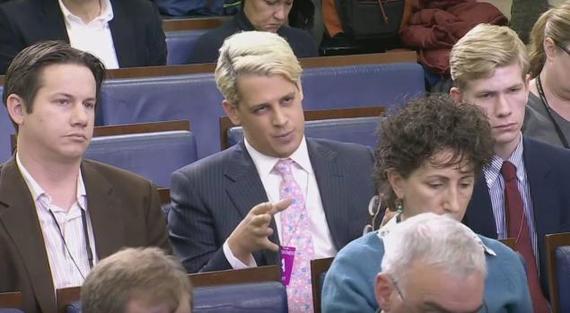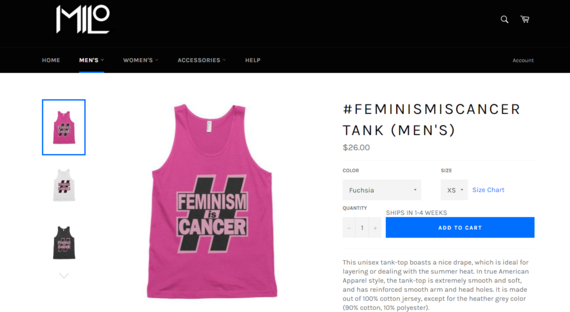When he's not being admitted to White House press conferences to ask the President of the United States to intervene with his Twitter account, proclaiming feminism to be cancer, swaying votes for Donald Trump, or palling around with Ann Coulter, Milo Yiannopoulos baits the gays on Instagram with photos like this -- and gets the star treatment in glossy LGBT magazines.
Two days ago, Out magazine caused a firestorm when it published a sprawling, nearly 5,500-word personality profile of alt-right media personality Milo Yiannopoulos. Long-form journalism isn't common these days; the Huffington Post, as a typical example, prefers bloggers to limit articles to between 500 and 1,000 words.
So this Milo story must be important, like this new Scientific American story that reveals how the FDA has manipulated and controlled (with their consent) all mainstream media, including the venerable NPR. Longer stories tend to be longer for a reason, often diving deep into a topic and revealing groundbreaking information. Here's Scientific American:
The deal was this: NPR, along with a select group of media outlets, would get a briefing about an upcoming announcement by the U.S. Food and Drug Administration a day before anyone else. But in exchange for the scoop, NPR would have to abandon its reportorial independence. The FDA would dictate whom NPR's reporter could and couldn't interview."My editors are uncomfortable with the condition that we cannot seek reaction," NPR reporter Rob Stein wrote back to the government officials offering the deal. Stein asked for a little bit of leeway to do some independent reporting but was turned down flat. Take the deal or leave it.
NPR took the deal. "I'll be at the briefing," Stein wrote.
Here's Out:
Yiannopoulos is among Trump's most prominent and gleeful supporters. "Donald Trump is such an obvious gay icon," Yiannopoulos says in the salon. "He's brassy, he's outrageous, his taste in interiors is gaudy and exhibitionist. He's a heavy-handed caricature of a billionaire. Everything about him is at once fantastic and camp. He's the drag queen you can vote for."
And:
"Milo is a lot of fun to be around during a bomb threat," Sommers says. "During that time he was getting death threats constantly. He got an impaled mouse sent to him in the mail."
And:
"On the one hand, you have the trans lobby that's all about control and oppression and misery and victimhood and grievance culture. And then drag queens, which is about taking the same kind of pain and expressing it through gender-defying comedy and transgression and subversion. I'm very much in the second camp."
And:
"If I were an artist creating fetishized images of black bodies, like trying to compare them to animals in some way, yeah, that could be racist," he says. "Let's have that conversation. But the fact is, I just like fucking blacks and, ergo, [am] unlikely to be a racist."
I have been critical of LGBT personalities, LGBT media and my struggles with the apparent values of gay culture in general.
This is to say that my opinions aren't always aligned with everyone else's and, to be honest, I do think that Milo Yiannopoulos is a queer figure worth discussing. Unfortunately, I can't argue with anyone who has criticized the story because what could have been a fascinating and informative profile of a confused blend of Ann Coulter and Oscar Wilde really amounts to little more than fawning over Yiannopoulos with too many words and a collection of adorable photos that involve clown drag and drag drag.
Since I haven't been blessed with a 5,500-word allotment here, I'll just cut to the chase and list a few of Out's missed opportunities.
Out Didn't Consider Its Readers - Or Totally Misread Them
With the exception of Milo Yiannopoulos's own words about himself, Chadwick Moore's profile of Milo Yiannopoulos is almost giddily reverent. Despite the circus images that accompany the story, nothing about Moore's story suggests the true extremity of what he says. Moore calls Yiannopoulos "a professional mischief maker and provocateur" and says he "swoops in with rapid-fire talking points delivered in a playfulness so foreign -- and intoxicating -- to most journalists and Americans that they are left standing in the rubble, dumbfounded." Sprinkled among Moore's epic strand of hyperbolic genuflecting toward Yiannopoulos are tales of Yiannopoulos's tough childhood in Kent, England and how, like a swoonworthy phoenix, It Got Better for Yiannopoulos and he rose up into a queer renegade, a cultural hero with boundless emotional fortitude!
Unfortunately for Moore and Out, a lot of people already knew enough about Milo Yiannopoulos to find this sort of saccharine pandering offensive. Yiannopoulos is among Donald Trump's most vocal supporters, and he must be a YOOGE boon to the Trump campaign's efforts to snare young voters. It's no coincidence that Yiannopoulos secured a spot hosting a "Gays for Trump" rally at the Republican National Convention and that Yiannopoulos's bread and butter (now that Twitter is no longer an option for him) is college campus speaking tours. Yiannopoulos has amassed a YOOGE following among rebellious college students, and he is directing their rebellion to the voting booths, telling them to vote for Donald Trump. If we equate Yiannopoulos with Trump, as we must, then that alone should have suggested to Out's editors that a fawning Seventeen magazine-style puff piece on Yiannopoulos wouldn't go down easily for most LGBT readers, and so many spoons full of sugar certainly doesn't mask the bitter truth.

During the 2016 Conservative Political Action Conference (CPAC) Yiannopoulos and (to his right) fellow Breitbart staffer Mike Ma bragged about crashing a White House press conference. Called on by the White House press officer, Yiannopoulos asked what the White House can do to restore the "verified" checkmark that Twitter revoked.
The Story Ignores Its Own Strange Irony
"The whole Trump project, the alt-right project, Breitbart, we recognize the media as public enemy number one," he says. "Is the media then going to report nicely about us? Of course not. At Trump rallies, the press pen is raised and at the back of the room and he's pointing at them, saying 'Look at this garbage, these slimeballs.' And the whole crowd is cheering. You think those people are going to report accurately on what happened? Of course they won't....Journalists haven't yet worked out that everyone hates them."
So here is Milo Yiannopoulos, celebrity spokesperson for "the alt-right project, Breitbart," diminishing the media to the feature writer of a glossy LGBT magazine. One would imagine that a writer who has been commissioned to author a cover story might have done some background research, and might have taken into consideration not only his apparent affinity for his interview subject, but also his readership. Out magazine is written for an LGBT audience.
Yiannopoulos told Joe Rogan on Rogan's podcast: "Yes - I would agree it would be better if I didn't behave like this, and if I could choose to be heterosexual I would do so." When pressed, he doubled down, "'If I could choose, I wouldn't be a homosexual. That doesn't make me self-loathing.'"
Obviously, people who know such things about Yiannopoulos are going to expect an Out magazine feature of him to seriously confront these sorts of proclamations, among others. But no, this and far more provocative statements, often described as homophobic, get passing references in the story, but no serious attention. It's ironic, then, that Yiannopoulos did confront his interviewer -- perhaps a journalist -- telling him that everyone hates him and that journalists are dishonest, "garbage and slimeballs"...and the end result is a dishonest-by-occlusion story that suggests its subject is nothing more than a playful imp. Which brings us to...

(Left) Typical posts from Yiannopoulos's Snapchat: with Mike Ma; captioning a photo of Ma "He'll come on your face but he won't kiss you"; (Right) Ma's verified Twitter profile, on which he calls himself an "Alt right propagandist" and "Nationalist cult leader." Ma is an employee of Yiannopoulos with equally high journalistic standards.
The Story Leaves Out Vitally Important Context -- Especially for Out Readers
This is how Moore characterizes the alt-right movement:
The alt-right is far from alone in a backlash against political correctness. In July, a Pew Research poll found that 59% of Americans agree that "too many people are easily offended these days over the language that others use," although less than a majority of Clinton supporters agreed with the statement.
The alt-right did not spring out of thin air. A decade ago, it was called the Tea Party. And while many would characterize the movement's values as racist, xenophobic, and nationalistic, Yiannopoulos sees himself as standing up for the nation's most oppressed. If one is to accept his view on the movement, the core philosophies are those that have always defined the right: small government, personal accountability, and a deep distrust of sweeping social movements and political correctness. Only now, thanks largely to Internet trolling culture and a swelling backlash against a culture predicated on "trigger warnings," has the extreme right seemed to grab hold of its own identity and run with it.
This is how Wikipedia characterizes the alt-right movement:
The alt-right has no official ideology, although various sources have said that it is associated with white nationalism,[1][2][6] white supremacism,[3][7][8] antisemitism,[1][2][9] right-wing populism,[6] nativism,[10] and the neoreactionary movement.[7][11]
Of course Wikipedia isn't an ideal reference, but it's worth citing because it is among the most-read of all websites. The Southern Poverty Law Center, a widely referenced organization that characterizes and monitors hate groups, describes the alt-right this way:
The Alternative Right, commonly known as the Alt-Right, is a set of far-right ideologies, groups and individuals whose core belief is that "white identity" is under attack by multicultural forces using "political correctness" and "social justice" to undermine white people and "their" civilization. Characterized by heavy use of social media and online memes, Alt-Righters eschew "establishment" conservatism, skew young, and embrace white ethno-nationalism as a fundamental value.
It is difficult to separate the alt-right, and indeed Breitbart -- Yiannopoulos's employer and starmaker -- from white supremacist ideology. In fact, the alt-right movement is the very vehicle through which white supremacy has been rocketed into the mainstream -- with help from Donald Trump. Even Yiannopoulos's former colleague (And friend? Frenemy? Antagonist?) Ben Shapiro has written since his departure from Breitbart that "Now Breitbart has become the alt-right go-to website, with Yiannopoulos pushing white ethno-nationalism as a legitimate response to political correctness, and the comment section turning into a cesspool for white supremacist mememakers."
This reality is given no serious discussion in the Out profile of Yiannopoulos. The story suggests, through Yiannopoulos's quotes, that the alt-right movement is only criticized for racism and other dangerous prejudices because people object to political incorrectness. That's bullshit. And then the story relays, through Yiannopoulos's quotes, that he just likes "fucking blacks and, ergo, [am] unlikely to be a racist." And the writer makes a feeble obligatory effort to level out this stunning (and intentionally provocative) comment by quoting Shaun King, who says "but there are real victims in this." Ah, OK, the story is going to go somewhere! And then: "He hasn't experienced the pain or seen it to understand it." Oh, OK. Well, Milo, you're excused then, you naive young man, you.
This is inexcusable for an LGBT magazine. I don't feel like I really should have to articulate why this is. But it is because the acceptance of LGBT people has followed upon the heels of the Civil Rights movement and the women's movement before it. It's all the same: It's all about treating all people with the same levels of dignity, humanity and respect. Moore may feel he did that in his profile of Milo Yiannopoulos, but unfortunately, when Moore gushes over his crush ("When he speaks, he lowers his chin and leans in intently, fixing a gaze with dark eyes that are at once doelike and cutting."), he is disrespecting and diminishing his readers -- people who know what Moore does not seem to understand: If an LGBT magazine is going to dedicate 5,500 words to a character like Milo Yiannopoulos, it had better have some reason beyond making him look pretty.
A tank top sold by Yiannopoulos on his website, Swag by Milo.
The Story Is Far Less Interesting Than Its Subject
I've been aware of Milo Yiannopoulos for the better part of a year, and I don't feel like the person whose words I've read and listened to are really represented in the Out article. Yiannopoulos himself does far more honest work of characterizing himself than the article's author does. Yiannopoulos says that he'd rather his (nonexistant) daughter had cancer than feminism; writer Chadwick Moore essentially tells us that Yiannopoulos is a playfully provocative imp, a survivor, and, to borrow words Moore quotes from Yiannopoulos, "complex and interesting." But Moore doesn't show us why Yiannopoulos is complex and interesting.
In fact, he is. Not because he says antagonistic things. If Yiannopoulos believes, as he says, that Amy Schumer and Lena Dunham are "boring," then he should have to admit that his new BFF Ann Coulter is likewise boring, just on the other side of the aisle. Yiannopoulos is interesting for a number of reasons, but given Out's special interests, I would expect a story in out to dedicate a bit more discussion and (dare I say) investigation into Yiannopoulos's complicated sexuality. He claims to be gay. In fact, he flaunts it -- believably so, as, at the risk of offending readers with stereotyping, Yiannopoulos's facial expressions, bodily movements and words are saturated in gayness; unless he's an incredible actor, he is gay through and through. And yet he has said countless times that he wishes he weren't -- and that he believes he's not self-loathing just because he wishes he were straight. Joe Rogan challenged Yiannopoulos on this and encouraged conversation about it. Out magazine did not. Rogan probed; the LGBT magazine coasted along the surface. I almost wonder whether the author and editors may admire Yiannopoulos more because of his lamentations of being gay. Gay men, I ask you, is this the kind of "straight acting" you ask for on your social apps?
Yiannopoulos has said what should be undeniably classifiable as racist comments, and yet he proclaims that he is only attracted to black men and therefore cannot be racist. That's fascinating -- for discussion's sake, given the obvious and undeniable marginalization of black men in the visible gay world, from glossy magazine photos to Davey Wavey videos to (especially) Grindr and the like. Personally, claiming to have sex with a lot of black men does nothing to convince me to ignore anyone's overtly racist sentiments and support of an overtly racist presidential candidate...but what a catalyst for some serious introspection among gay men to see someone who spews racist rhetoric actually claiming to embrace black men's sexuality when so few supposedly nonracist white men even consider doing so. Not even a passing reference to such dichotomies.
And Yiannopoulos is perhaps best known, at least among his college followers, for denouncing so many women who have alleged that they've been sexually assaulted on campus. He lives in the same world as Brock Turner, the Stanford swimmer who got a slap on the wrist after he was found having sex with an unconscious woman by a dumpster, and yet one of Yiannopoulos's standard talking points is that "there is no rape culture in the West," claiming that all actual rapists here go to jail. To too many frat boys to count, and to the horror and revulsion of many college women, Yiannopoulos is inextricably connected to denial and decriminalization of sexual assault, particularly on college campuses. And yet a young, pre-famous Yiannopoulos once self-published a poetry chapbook that liberally sampled or plagiarized lyrics from Tori Amos, who is likewise inextricably connected to rape, having co-founded the Rape, Abuse and Incest National Network (RAINN) decades ago. The idea of it is such a contradiction, it's as if...well, just imagine, for example, Donald Trump's wife giving a speech using exactly the same words as the wife of Barack Obama, the man he suggests is the antichrist.
Speaking of this, this commentary on Out's commentary-free propaganization of Milo Yiannopoulos while somehow erasing every legitimately compelling aspect of his persona from the story has reached its conclusion.
And using the paradoxical logic of Out's presentation of Milo Yiannopoulos, I'll use my commentary of Milo Yiannopoulos to remind you of why when he says "you're being politically incorrect and need to shut up," you may want to think twice. Here's Tori Amos from 1992 singing about her rape experience. Unlike the Out magazine story, there's nothing hyperbolic about it, nothing overblown and ornate: just a harrowing, honest report. Following that is a video of Amos from this week discussing a new single, Flicker, which she released to raise money for RAINN and as part of the soundtrack of a new Netflix documentary called Audrie and Daily, released today, that chronicles the story of two young women whose lives were ruined by sexual assault.
We know about Amos in part because of her profound and honest writing and performance, and because she fought to bring attention to the psychological devastation of sexual assault and helping people who suffer it. We know about Yiannopoulos mostly because he says that feminists are worse than cancer and because he draws record crowds at university campuses, where he decries political correctness and says that rape is a myth.
Sometimes we need to remember why terms like "rape culture" were created in the first place: because this kind of thing absolutely destroys people's lives, and some people actually care, even as others clown around.


